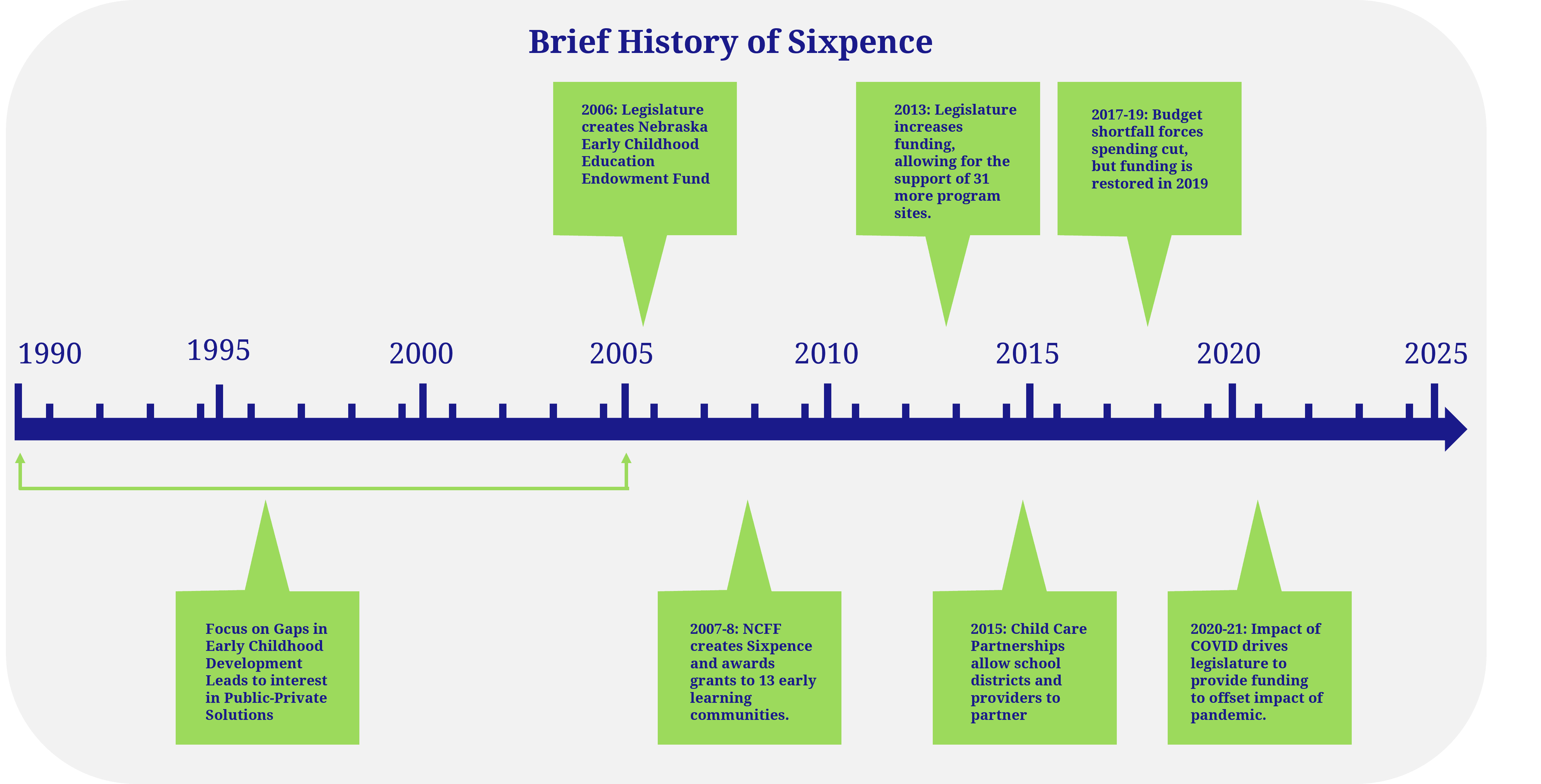Mission
Sixpence provides funds and technical guidance to high-quality early childhood programs that address the unique needs of children from the prenatal period to age 3, focusing particularly on services for pre-born children, infants and toddlers who are most likely to encounter challenges to their healthy physical, cognitive and social development, putting them at risk of struggling in school and life.
Mission statement: Supporting local and state partnerships that raise the bar for highly effective, quality early care and education for Nebraska’s families with the youngest and most vulnerable children from birth to age three.
Vision statement: Nebraska’s communities and families come together to ensure the well-being of all children by having the best possible start to life.

Sixpence-funded services help offset the obstacles and liabilities that would otherwise be likely to prevent children at risk from keeping up with the developmental progress of their more advantaged peers.
History of Sixpence

Detailed History
1990s-2005:
- Academic, social, and economic benefits of early childhood education frequently part of public policy conversations.
- Conversations focus on gaps in support for early childhood development in the first three years of life.
- Issue exceeds the capacity of the public sector to address on its own.
- Interest grows in a public-private solution.
2006:
- Through the leadership of Senator Ron Raikes, the Nebraska Legislature creates the Nebraska Early Childhood Education Endowment Fund.
- Provides $20 million commitment from private investors, triggering a $40 million match from public funds.
- Nebraska Department of Education grants these funds to locally controlled, high-quality early learning programs for infants and toddlers at risk.
- Governor Dave Heineman appoints a Board of Trustees to oversee the grants, consisting of the Commissioner of Education (or representative), the CEO of the Nebraska Department of Health and Human Services (or representative), as well as early childhood professionals representing rural and urban communities, and two additional private sector representatives.
2007-08:
- Nebraska Children and Families Foundation creates the Sixpence brand for fundraising and grant-making operations.
- In 2008, the first round of grants were awarded to 13 community early learning partnerships throughout the state, amounting to $1.7 million.
- Grantees are required to match their awards through locally sourced funds or other resources.
2013:
- Success of Sixpence in improving children’s outcomes and its commitment to fiscal accountability, encourages Nebraska lawmakers to increase the state’s public investment.
- New legislation provides an additional $11 million for grant awards over three years.
- Sixpence is able to fund 31 program sites throughout the state.
2015:
- Nebraska communities still lack the facilities, resources, and professional staff to deliver the PN-3 programs urgently needed throughout the state.
- Two new bills pass: one enables Sixpence to create Childcare partnerships between school districts and independent childcare providers; the other makes it possible to implement the new partnerships in a cost-neutral way by capturing federal CCDBG (Child Care Development Block Grant) dollars earmarked for improving the quality of child care programs.
- Professional development and quality improvement resources become more available to a wider array of programs.
- The Sixpence Board of Trustees authorizes the first Child Care Partnership grants to five Nebraska Communities.
2017-19:
- A $900 million budgetary shortfall prompts Governor Ricketts to call for a 4% across-the-board cut to state spending.
- Results in a $200,000 decrease in Sixpence funding during the budgetary biennium.
- In 2019, the Legislature votes to restore these dollars to Sixpence.
2020-21:
- The effects of the pandemic are extraordinarily severe on families with young children.
- Social and financial stress on parents amplify the already considerable challenges of providing safe, supportive and nurturing family and home environments.
- A destabilized childcare marketplace forces the temporary or permanent closure of many programs already operating under unsustainable financial conditions.
- Under the leadership of Appropriations Committee Chair Senator John Stinner, the Nebraska Legislature passed bill to help offset the impact of the pandemic on children’s early development.
- The bill appropriates an additional $2.5 million for two years to reinforce the work of Sixpence, leading to 11 new grants for family engagement and center-based programs.

